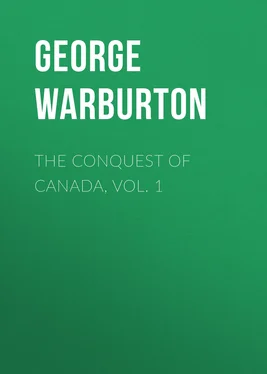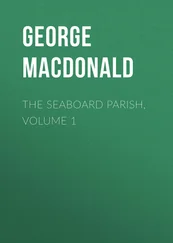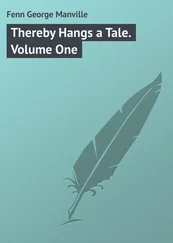George Warburton - The Conquest of Canada, Vol. 1
Здесь есть возможность читать онлайн «George Warburton - The Conquest of Canada, Vol. 1» — ознакомительный отрывок электронной книги совершенно бесплатно, а после прочтения отрывка купить полную версию. В некоторых случаях можно слушать аудио, скачать через торрент в формате fb2 и присутствует краткое содержание. Жанр: foreign_prose, История, foreign_edu, foreign_antique, на английском языке. Описание произведения, (предисловие) а так же отзывы посетителей доступны на портале библиотеки ЛибКат.
- Название:The Conquest of Canada, Vol. 1
- Автор:
- Жанр:
- Год:неизвестен
- ISBN:нет данных
- Рейтинг книги:5 / 5. Голосов: 1
-
Избранное:Добавить в избранное
- Отзывы:
-
Ваша оценка:
- 100
- 1
- 2
- 3
- 4
- 5
The Conquest of Canada, Vol. 1: краткое содержание, описание и аннотация
Предлагаем к чтению аннотацию, описание, краткое содержание или предисловие (зависит от того, что написал сам автор книги «The Conquest of Canada, Vol. 1»). Если вы не нашли необходимую информацию о книге — напишите в комментариях, мы постараемся отыскать её.
The Conquest of Canada, Vol. 1 — читать онлайн ознакомительный отрывок
Ниже представлен текст книги, разбитый по страницам. Система сохранения места последней прочитанной страницы, позволяет с удобством читать онлайн бесплатно книгу «The Conquest of Canada, Vol. 1», без необходимости каждый раз заново искать на чём Вы остановились. Поставьте закладку, и сможете в любой момент перейти на страницу, на которой закончили чтение.
Интервал:
Закладка:
It would be but tedious to repeat here all the well-known story of Christopher Columbus; 36his early dangers and adventures, his numerous voyages, his industry, acquirements, and speculations, and how at length the great idea arose in his mind, and matured itself into a conviction; then how conviction led to action, checked and interrupted, but not weakened, by the doubts of pedantic ignorance, 37and the treachery, 38coolness, or contempt of courts. On Friday, 39the 3d of August, 1492, a squadron of three small, crazy ships, bearing ninety men, sailed from the port of Palos, in Andalusia. Columbus, the commander and pilot, was deeply impressed with sentiments of religion; and, as the spread of Christianity was one great object of the expedition, he and his followers before their departure had implored the blessing of Heaven 40upon the voyage, from which they might never return.
They steered at first for the Canaries, over a well-known course; but on the 6th of September they sailed from Gomera, the most distant of those islands, and, leaving the usual track of navigation, stretched westward into the unknown sea. And still ever westward for six-and-thirty days they bent their course through the dreary desert of waters; terrified by the changeless wind that wafted them hour after hour further into the awful solitude, and seemed to forbid the prospect of return; bewildered by the altered hours of day and night, and more than all by the mysterious variation of their only guide, for the magnetic needle no longer pointed to the pole. 41Then strange appearances in the sea aroused new fears: vast quantities of weeds covered the surface, retarding the motion of the vessels; the sailors imagined that they had reached the utmost boundary of the navigable ocean, and that they were rushing blindly into the rocks and quicksands of some submerged continent.
The master mind turned all these strange novelties into omens of success. The changeless wind was the favoring breath of the Omnipotent; the day lengthened as they followed the sun's course; an ingenious fiction explained the inconstancy of the needle; the vast fields of sea-weed bespoke a neighboring shore; and the flight of unknown birds 42was hailed with happy promise. But as time passed on, and brought no fulfillment of their hopes, the spirits of the timid began to fail; the flattering appearances of land had repeatedly deceived them; they were now very far beyond the limit of any former voyage. From the timid and ignorant these doubts spread upward, and by degrees the contagion extended from ship to ship: secret murmurs rose to conspiracies, complaints, and mutiny. They affirmed that they had already performed their duty in so long pursuing an unknown and hopeless course, and that they would no more follow a desperate adventurer to destruction. Some even proposed to cast their leader into the sea.
The menaces and persuasions that had so often enabled Columbus to overcome the turbulence and fears of his followers now ceased to be of any avail. He gave way to an irresistible necessity, and promised that he would return to Spain, if unsuccessful in their search for three days more. To this brief delay the mutineers consented. The signs of land now brought almost certainty to the mind of the great leader. The sounding-line brought up such soil as is only found near the shore: birds were seen of a kind supposed never to venture on a long flight. A piece of newly-cut cane floated past, and a branch of a tree bearing fresh berries was taken up by the sailors. The clouds around the setting sun wore a new aspect, and the breeze became warm and variable. On the evening of the 11th of October every sail was furled, and strict watch kept, lest the ships might drift ashore during the night.
On board the admiral's vessel all hands were invariably assembled for the evening hymn; on this occasion a public prayer for success was added, and with those holy sounds Columbus hailed the appearance of that small, shifting light, 43which crowned with certainty his long-cherished hope, 44turned his faith into realization, 45and stamped his name forever upon the memory of man. 46
It was by accident only that England had been deprived of the glory of these great discoveries. Columbus, when repulsed by the courts of Portugal and Spain, sent his brother Bartholomew to London, 47to lay his projects before Henry VII., and seek assistance for their execution. The king, although the most penurious of European princes, saw the vast advantage of the offer, and at once invited the great Genoese to his court. Bartholomew was, however, captured by pirates on his return voyage, and detained till too late, for in the mean while Isabella of Castile had adopted the project of Columbus, and supplied the means for the expedition.
Henry VII. was not discouraged by this disappointment: two years after the discoveries of Columbus became known in England, the king entered into an arrangement with John Cabot, an adventurous Venetian merchant, resident at Bristol, and, on the 5th of March, 1495, granted him letters patent for conquest and discovery. Henry stipulated that one fifth of the gains in this enterprise was to be retained for the crown, and that the vessels engaged in it should return to the port of Bristol. On the 24th of June, 1497, Cabot discovered the coast of Labrador, and gave it the name of Primavista . This was, without doubt, the first visit of Europeans to the Continent of North America, 48since the time of the Scandinavian voyages. A large island lay opposite to this shore: from the vast quantity of fish frequenting the neighboring waters, the sailors called it Bacallaos . 49Cabot gave this country the name of St. John's, having landed there on St. John's day. Newfoundland has long since superseded both appellations. John Cabot returned to England in August of the same year, and was knighted and otherwise rewarded by the king; he survived but a very short time in the enjoyment of his fame, and his son Sebastian Cabot, although only twenty-three years of age, succeeded him in the command of an expedition destined to seek a northwest passage to the South Seas.
Sebastian Cabot sailed in the summer of 1498: he soon reached Newfoundland, and thence proceeded north as far as the fifty-eighth degree. Having failed in discovering the hoped-for passage, he returned toward the south, examining the coast as far as the southern boundary of Maryland, and perhaps Virginia. After a long interval, the enterprising mariner again, in 1517, sailed for America, and entered the bay 50which, a century afterward, received the name of Hudson. If prior discovery confer a right of possession, there is no doubt that the whole eastern coast of the North American Continent may be justly claimed by the English race. 51
Gaspar Cortereal was the next voyager in the succession of discoverers: he had been brought up in the household of the King of Portugal, but nourished an ardent spirit of enterprise and thirst for glory, despite the enervating influences of a court. He sailed early in the year 1500, and pursued the track of John Cabot as far as the northern point of Newfoundland; to him is due the discovery of the Gulf of St. Lawrence, 52and he also pushed on northward, by the coast of Labrador, 53almost to the entrance of Hudson's Bay. The adventurer returned to Lisbon in October of the same year. This expedition was undertaken more for mercantile advantage than for the advancement of knowledge; timber and slaves seem to have been the objects; no less than fifty-seven of the natives were brought back to Portugal, and doomed to bondage. These unhappy savages proved so robust and useful, that great benefits were anticipated from trading on their servitude; 54the dreary and distant land of their birth, covered with snow for half the year, was despised by the Portuguese, whose thoughts and hopes were ever turned to the fertile plains, the sunny skies, and the inexhaustible treasures of the East. 55
Читать дальшеИнтервал:
Закладка:
Похожие книги на «The Conquest of Canada, Vol. 1»
Представляем Вашему вниманию похожие книги на «The Conquest of Canada, Vol. 1» списком для выбора. Мы отобрали схожую по названию и смыслу литературу в надежде предоставить читателям больше вариантов отыскать новые, интересные, ещё непрочитанные произведения.
Обсуждение, отзывы о книге «The Conquest of Canada, Vol. 1» и просто собственные мнения читателей. Оставьте ваши комментарии, напишите, что Вы думаете о произведении, его смысле или главных героях. Укажите что конкретно понравилось, а что нет, и почему Вы так считаете.












